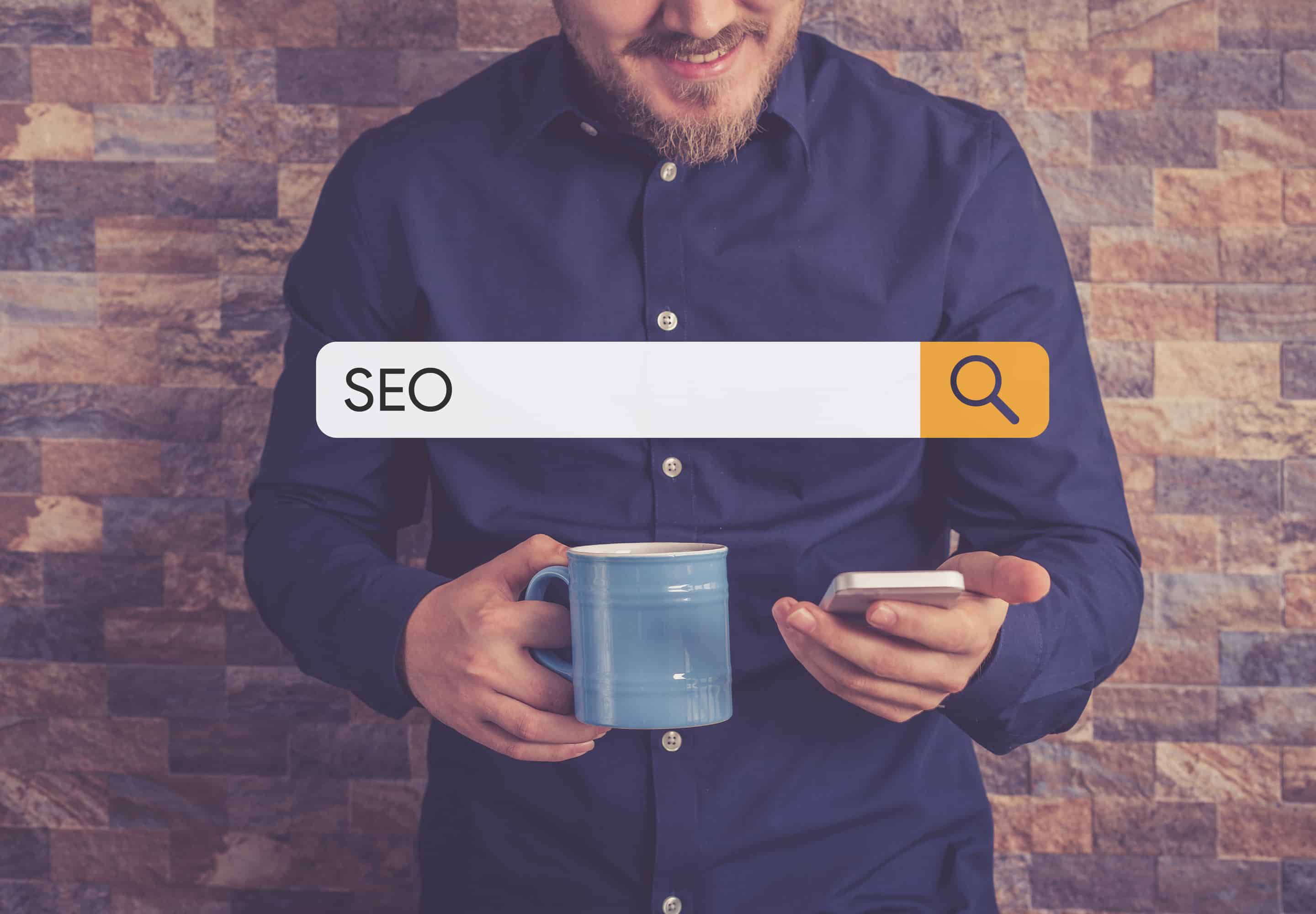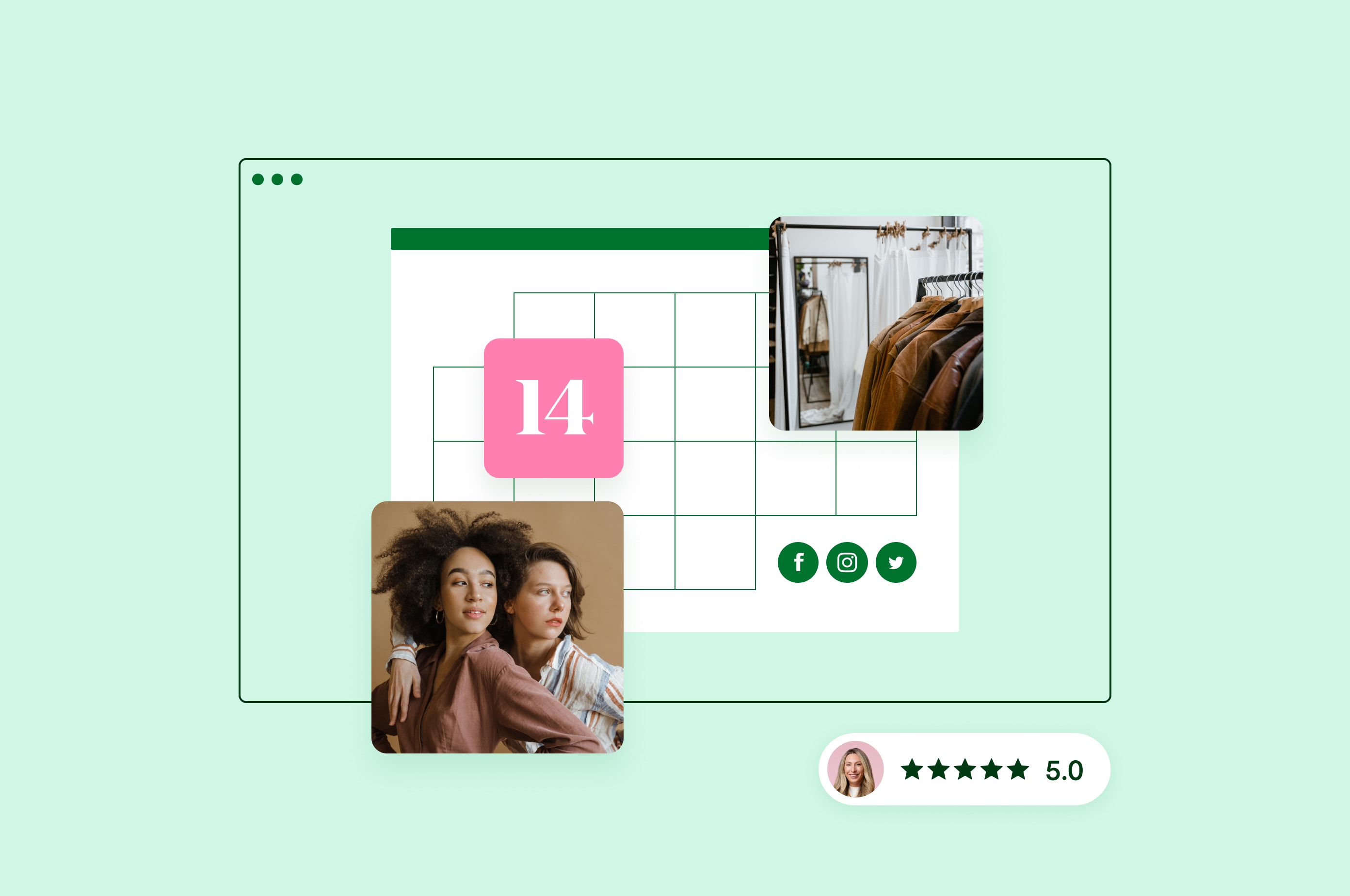What is digital marketing?
A beginner's guide to digital marketing basics
 January 23, 2021
January 23, 2021 9 minute reading
9 minute reading
As a small business owner, you have big goals. You want to attract loyal customers, build a dedicated team, and become a leader in your niche.
You're looking for new ways to accomplish these goals. Maybe you've relied on traditional marketing methods like TV spots or newspaper ads, but ended up overspending for vague results. Maybe you've heard it’s essential to focus on digital marketing strategies, but found the term vague, overwhelming, and confusing, leaving you unsure how it will actually help.
We're here to clear up the confusion. With digital marketing, you can reach a massive audience, boost brand awareness, and increase sales — all while keeping your costs in check.
Ready to discover what digital marketing is, and why is it important for business owners?
Let's get into it without further ado
Digital Marketing Basics
1. What is digital marketing?
Digital marketing, also called web marketing, internet marketing, or online marketing, refers to all the marketing strategies that a business executes using the internet and other digital channels to reach its actual or potential customers. Your company’s digital marketing efforts can include everything from paid online channels like SEM (search engine marketing) and non-paid online channels like SEO (search engine optimization).
2. Why digital marketing is important to your business
Does your company really need digital marketing to grow? In short, absolutely. Here are 8 reasons why:
It levels the playing field for small business owners. For small businesses, competing with the big guys isn’t exactly easy. For example, if you run a mom-and-pop diner, it’s impossible to buy more TV spots than IHOP. But here’s the thing: Digital marketing lets you level the playing field, no matter how big your competitors are. With the right digital strategies, you can build a massive social media following, rank at the top of Google, or sell tons of products via email.
You can target your ideal audience. When you invest in traditional marketing like magazine articles or TV ads, you can target your audience to an extent. After all, you know who usually reads the magazine or watches the TV show. But what if you really want to zero in on your audience and optimize your budget? It doesn’t matter if your ideal audience includes stay-at-home parents or high-powered CEOs. You can find and target your ideal buyer using digital marketing tactics, even if your audience is small or has niche interests.
You reach customers where they are. Fewer people than ever before are reading magazines and newspapers or listening to the radio. In 2018, newspaper circulation in the United States reached its lowest level since 1940. Local news audiences have declined for more than a decade. Instead, your customers are spending more time online. In fact, 90% of American adults use the internet, almost 70% use Facebook regularly, and nearly 75% use YouTube routinely. Digital marketing channels allow you to target users by demographics, interests, and even devices. That means you can connect with the right person at the right time, making the most of your marketing efforts.
It allows you to easily track and monitor your campaigns. Tracking results from traditional ad campaigns isn’t easy. You might know how many times your ad appeared. Yet it’s impossible to know how many people actually responded to your newspaper or TV ad. When you launch a digital marketing campaign, you can track virtually any detail. With a few clicks, you can find out how many people clicked on your ad and whether they bought something. You can even target the same group of people with another ad.
It's easy to scale and adapt. When you find a digital tactic that works for your business, you can easily scale it. After all, you aren't tied to a TV ad or committed to direct mailing months in advance. That means you can spend a bit more in digital and get exponential results, adapting to your needs as they evolve. But how do you find what works? You can rely on analytics tools to measure your results. Because you’re in complete control of your digital efforts, you can test out new ideas at any time. If you like the results you get, you can scale them up. If they don’t work out as well as you’d hoped, you can stop them before spending too much.
Your competitors are already doing it. No matter your industry, there’s a good chance your competitors already have a head start with digital marketing. In fact, 70% of marketers are already using content marketing, and almost 75% are using social media. Almost two-thirds are investing in SEO, and nearly half are using email automation.
Builds brand reputation. Whether your company is new or seasoned, it’s important to increase brand awareness continually. Digital campaigns can introduce your brand to relevant customers and help you establish a positive reputation with loyal customers.
Expands reach. No matter the size of your business, you need to expand your customer base continually. Digital marketing can reach customers across the nation and around the globe so you can expand to new markets and even trade globally.
3. Types of digital marketing
Digital marketing includes over a dozen channels, each with its own strategies and tools that you can use to help you meet your business goals. To help you understand these channels and how they can benefit your business, here's an explanation of some of the most common—and most effective—types of digital marketing
Content marketing
Content marketing refers to the creation and promotion of all types of content, whether it's written, audio, or visual content. Content marketing assets include blog posts, case studies, videos, podcasts, and more. A successful content marketing strategy attracts and guides customers through every stage of the sales funnel.
How can your business benefit from content marketing?
You can build trust. When you create helpful content that solves customers’ problems, you gain credibility. Over time, you can establish trust, which can lead to sales.
You can improve brand awareness. The more high-quality content you create, the more chances you have to introduce your brand and rank with search engines.
💡 Feeling a bit overwhelmed by content marketing? These resources might help you out.
Email marketing
This channel connects with customers directly in their email inboxes. An email marketing strategy can include everything from sale announcements to monthly newsletters to remarketing messages. An email service provider (ESPs) like MailChimp or ConvertKit can help small businesses execute these strategies more efficiently, but email marketing specialists may also use other tools or methods to craft a profitable strategy.
The secret of email marketing success is writing compelling headlines and high converting copy that makes people want to take the next step. The more relevant your emails are to what potential customers need, the better they will work to build your relationship with them, so they think of you when they're ready to buy.
How can your business benefit from email marketing?
You can get an impressive ROI. Email marketing has an average ROI of 3800%. That means email can generate $38 in revenue for every $1 in ad spend.
You can keep the costs low. Email marketing lets you get right into inboxes, so you don’t have to pay for an ad every time you want to connect directly with customers.
Insider tips for email marketing
Be aware that there are strict guidelines for email marketing. Users must be able to opt-in, so you know they want your emails before you send them anything; otherwise, they'll see you as a spammer.
When writing headlines for emails, avoid email spam trigger words or anything that seems overly promotional. These affect email deliverability. If they end up in the spam box or, in the case of Gmail, in the "promotions" tab, people may not see them at the right time - or at all
Ensure that your email marketing is relevant to the users that you are selling it to. It will increase both your open rates and account credibility.
💡 Need inspiration? Here are 8 email marketing examples that boost leads and sales.
Social media marketing
There are almost 2.8 billion social media users worldwide, around one-third of all internet users. That means you can't ignore social media for marketing your business. Social media is a great tool to give customers a personal connection with you.
In addition to the huge audiences, most social media sites have the added advantage of analytics, giving you more data about your audience's composition and preferences than ever before. In short, social media is a major vehicle for business growth.
With social media marketing, you can connect with customers on their preferred platforms. You can use YouTube, Instagram, Tiktok, Pinterest, Facebook, or other social media platforms to grow a loyal following and sell products.
💡 Not sure which social platform or feature is best for your needs? These resources might help:
How can your business benefit from social media marketing?
You can build relationships. Social media is ideal for making connections and growing a community. Over time, social media can help you improve customer loyalty.
You can offer customer service. Since social media allows for public commenting and private messaging, you can rely on this channel for simple, cost-effective customer service.
Search engine optimization (SEO)
SEO refers to techniques and strategies that make your website more visible in Google search results, ideally ranking in the top 10 results for search queries that are important for your business. This can include changes and optimizations to the content on the site; the structure of the site including navigation, links to and from site pages, and even some behind-the-scenes code; and links from external websites to your own because of the merit of your content.
Of course, that's not all there is to SEO. In fact, there's a long list of search ranking factors. In a nutshell, Google wants to know your business is trustworthy and it looks for signals like:
External reviews of your business
Brand mentions from trusted external sources
Social media sharing
And more. The more positive these signals are, the better your pages and your site will rank.
💡 Feeling a bit lost in the world of SEO? These resources might just have the answers you're looking for!
How can your business benefit from SEO?
You can win new customers. SEO increases the chance of customers finding your website when searching for queries related to your company. Whether customers are just researching or they’re ready to buy, getting them to your website is the first step in winning their business.
You can establish authority. When you rank high for popular search queries, your business can become an expert on key topics. Over time, you can increase your credibility and drive even more business.

Ref: Cleo Kirkland - SEO expert and Fiverr Learn instructor
Pay-per-click advertising (PPC)
The focus of PPC advertising is on helping to achieve marketing goals such as brand awareness, content downloads, newsletter sign-ups, website traffic, leads, and of course conversions.
While you Google a search term you've probably noticed that a few ads appear at the top of the search results. These ads are served by AdWords and your PPC strategy aims to ensure that your ad comes up at the right time to target the people you most want to reach. These ads also appear on mobile devices. Because of the positioning, these ads get a lot of clicks, which means more traffic, sales, and leads for your business.
How can your business benefit from PPC?
You can generate leads and sell products. Since PPC ads can target customers at any stage of the sales funnel, they’re ideal for driving sales and collecting contact information from warm leads.
You can remarket to customers. PPC ads can also target existing customers or warm leads who haven’t purchased yet.
Insider tips for PPC
Make the purchase process as simple as possible, so your ads result in more paying customers. Remember, you are paying per click.
Increase your return on investment (ROI) by taking advantage of the built-in AdWords testing features.
Vary titles and descriptions on a rotating basis to determine which are the best performing ads for your business.
Affiliate marketing
With affiliate marketing, you authorize others to broaden your audience, scale traffic, and drive sales for your business. Then you pay a commission for each sale. Your business can join large, established affiliate platforms like Amazon Associates or Fiverr affiliates or you can set up your own.
How can your business benefit from affiliate marketing?
You can increase revenue and scale traffic without doing extra work. Since you rely on affiliates to promote your products and drive more prospects to your website, you can get more sales with minimal additional work.
You can get valuable endorsements. Affiliates often create in-depth reviews or write endorsements to drive sales. Since almost 90% of consumers trust online reviews as much as personal recommendations, affiliate marketing can offer incredible value.
Referral marketing
Referral traffic means customers who clicked on a link on another website to get to your website. Referral traffic often comes from blog posts that link to your business or company listings in online directories.
How can your business benefit from referral marketing?
You can get warm leads. Customers who clicked over to your website have shown an interest in what your business has to offer. As warm leads, they’re easier to convert than cold leads.
You can improve SEO. As you build more referral links, search engines assign more value to your website. Over time, you can boost your SEO, which improves your rankings in search results.
4. Digital marketing examples
What does digital marketing look like in action? Here are some examples from industry-leading companies.
Anheuser-Busch
When the pandemic hit in 2020, the closure of bars and stay-at-home orders drove an e-commerce alcohol rush. In response, Anheuser-Busch teamed up with alcohol delivery service, Drizly, to launch a strategy using Facebook's Collaborative Ads.
Being that Anheuser-Busch doesn't have a strong direct-to-consumer presence, Collaborative Ads enabled it to direct users to a retailer's website (Drizly). It was compliant with alcohol sales regulations and enabled the targeting of specific users by age, location, and preferences.
Drizly saw an increase in shoppers that peaked in Q3 of 2020 with a 700% increase in sales over January and February. As for Anheuser-Busch, year over year, Bud Light had a 28% increase in purchases and Michelob Ultra saw an 11% lift.
Key takeaway: When the market throws you a curveball, you need to adapt quickly. Shifting advertising to an effective online channel and partnering with the right brand not only kept Anheuser Busch afloat but helped them improve year over year.
Slack
Slack helps more than 12 million daily active users to stay connected. Its cloud-based instant messaging platform has become a go-to solution for remote work collaboration, enabling you to ditch confusing email threads for well-organized channels.
But how did it take off? Slack made three key moves before officially launching:
It created the "Slack Wall of Love" on Twitter, which still exists today, and is a place where users sing praises about the tool. This created a strong form of social proof.
It had well-known companies use the tool and displayed testimonials from them on a landing page.
It created articles positioning the tool as the "email killer" and partnered with a PR firm to get them published in relevant tech publications (online and offline). Fast Company, TechCrunch, and The Verge were all on the list.
Once users began adopting the software, Slack continued to act on its promise of delivering an amazing customer experience. The software was easy to use. If you quit, you could get money back for any unused credits. And, it had a fast response time to customer service issues.
These tactics, along with a strong product-market fit, took the company from 15,000 users in 2014 to 12+ million in 2020, earning it the title as the fastest-growing business app in history. It also continues to show significant year-over-year revenue growth.
Key takeaway: Once you have your product, positioning, and customer service channels in place, you need to make your solution known and trusted by the world. You can do so by appearing in the high-traffic publications your audience reads. Social proof is also helpful to create a positive buzz and remove doubts from the minds of your potential customers.
Airbnb
Airbnb has over seven million listings worldwide and over 150 million users.
The key to Airbnb's digital marketing strategy lies largely in user-generated content (UGC) where people share photos and videos of their homes available for rent on Airbnb as well as homes they rent while on vacation. Then, Airbnb reshares that content and tags the original person who posted it.
This helps to promote their listings and provides travel inspiration for followers. It also becomes highly impactful when influencers like Mariah Carey are the original content creators. Airbnb began hosting famous people such as Lady Gaga, Wiz Khalifa, and Drake to boost brand awareness. Its Instagram account currently has over 4.7 million followers and gets thousands of engagements on each post.
Key takeaway: You don't always have to create all of your content. Some businesses naturally lend themselves to user-generated content which can save you a significant amount of time and resources while being more effective. You can then amplify the impact of your content by working with influencers.
Tesla
Tesla is on a mission to accelerate the world's transition to sustainable energy and is working towards that mission by manufacturing electric vehicles. The innovative company also has a unique factor that many of its long-standing competitors lack: Elon. Can you name any of the founders or CEOs of Chevrolet, BMW, or Audi off the top of your head?
Elon Musk has long created a buzz about his projects, including Tesla, by using Twitter. He has over 49 million followers on the platform and posts regularly. He has gained popularity by sharing updates about the company as well as his, often humorous, own opinions.
Musk's strong personal brand transfers over to Tesla which has over 8.6 million followers on Twitter (far more than its competitors). The company page posts interesting updates about once per week and garners over tens of thousands of engagements, sometimes even hundreds of thousands. Tesla also hosts live stream events on Twitter which generate significantly higher levels of buzz. For example, the cybertruck unveil has over 2.6 million views.
Key takeaway: Personal branding is powerful. Founders and CEOs can help boost the popularity and awareness of their company by building a presence on social media. Maintaining a regular presence and using social to unveil new products and updates can help to encourage a following and generate buzz.
The bottom line: digital marketing helps build your business
No matter how big or how quickly you want to build your business, digital marketing is key. From PPC to social media, digital marketing strategies let you connect with your customers online and stay competitive in an increasingly digital economy. With its customizable, versatile, and scalable nature, digital marketing can drive traffic and target conversions, ultimately allowing you to reach your business goals.
If you're sold on why digital marketing will benefit your business, pick the channel(s) that you feel will be most beneficial to your business and start looking for a marketing expert to help you build, launch, and test your campaign. You can find digital marketing experts on Fiverr, or post to job boards explaining your needs. It's okay to start small—pick one channel, one expert, and launch one campaign and start to see digital marketing in action and watch your business grow.





